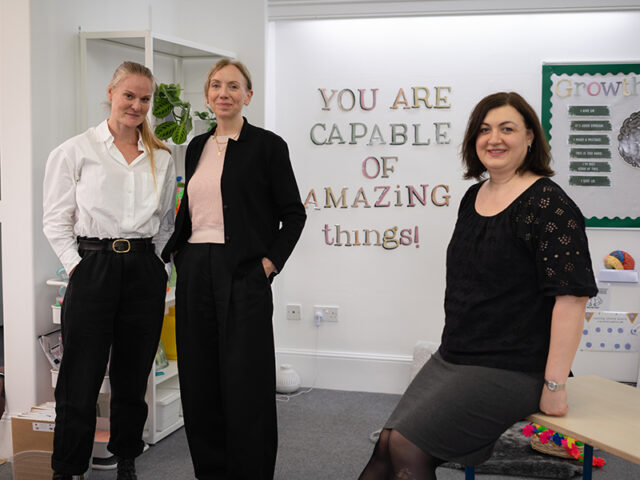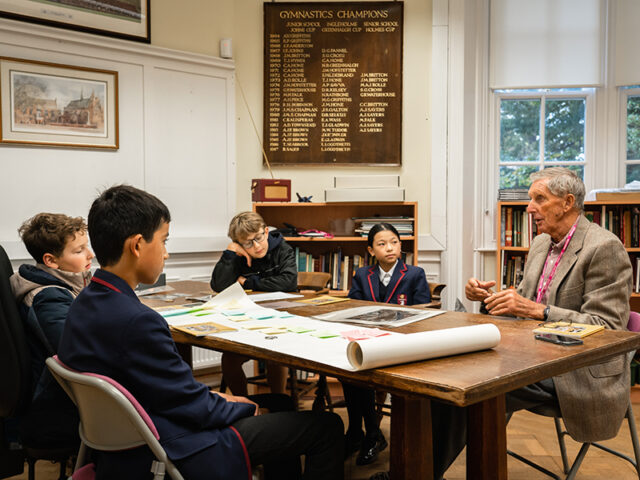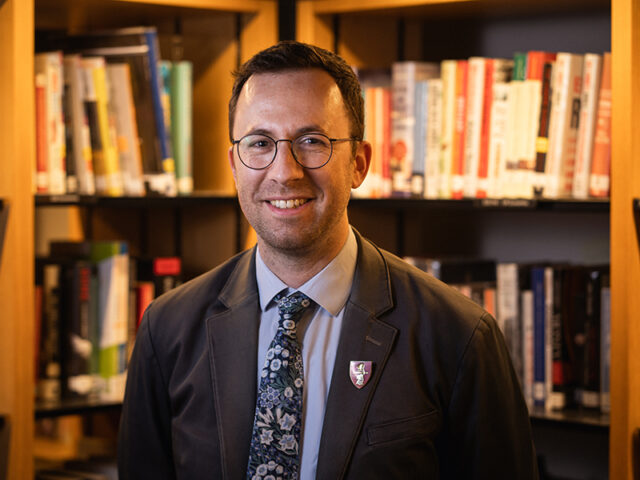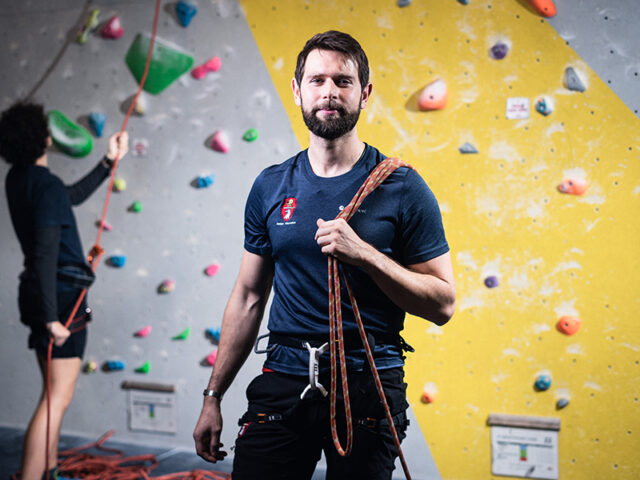This year, one of our whole school academic aims is to promote the act of reading for pleasure. There are no tests or assessments though – this one’s ‘just for fun’.
In a world where screens are becoming ever more present in our lives, and a myriad activities and social events compete for our attention, it is easy to forget the enjoyment of a good book and the restorative benefits of personal space to read. Even as working adults, reading is often an activity reserved for the sun loungers on holiday – it can be hard to find the time.
Whilst our pupils are great at preparatory reading for their studies, we wanted to remind everyone in our community – pupils, parents and staff – that reading for pleasure is something that we value and should be enjoyed. The benefits to our wellbeing, academic and career outcomes are all widely reported on, but the reason I want us to safeguard time for reading goes deeper.
To empathise with characters and to get lost in their story is inherently human. It has nothing to do with what disciplines you’re interested in, or what career you want to do. It is all about existing as human beings in the same society, developing empathy, broadening your perspective on the world, and finding shared points of reference.
We’re not purely focusing on fiction though – the emphasis is on reading for pleasure. Don’t worry whether it’s highbrow or lowbrow, whether it’s on a list of recommended reads, a biography of someone who intrigues you, or whether it’s just that the cover of the book stood out when you walked past the shop window.
There’s been a huge boom in verse novels recently (a type of narrative poetry that tells a novel-length story through poetic form). Rather than pages of dense text, the blank space around the verses means it can be accessed quite quickly and is perhaps more appealing to the TikTok generation. The visual format of graphic novels teaches us about narrative as we fill in the gaps between images to construct the story. Listening to an audiobook on the bus or walk to work/school can be a fantastic way to access novels. And the popular science non-fiction is a fascinating way to explore different views of the world. It all counts! If it engages you, then go for it.
Similarly, if you’re not enjoying it, don’t feel like you have to get to the end. It’s ok to give up. There’s no way to know when you pick up a 500-page novel whether you’re going to enjoy it or not. If you were watching TV, you’d just change the channel.
Our Librarian Ms Niland is phenomenal at finding just what you need. In addition to the extensive reading lists on the library portal (themed categories such as anti-racist readings, pride, music, poetry), along with the ‘Highgreat Reads’ lists for each year group, this year we’ve asked academic departments to recommend books related to their subject. Not as part of pupils’ academic reading list, but to build a broader view of what might be enjoyable.
For example, Mark Haddon’s The Curious Incident of the Dog in the Night-Time might be a good match for a person interested in mathematics, but actually it’s a story about a boy and his family. Or the Classics department, for instance, have recommended stories set in Roman times. Last half term pupils could choose from History, Geography, Classics or Religion and Philosophy, and this half term the list has been set by our language specialists.
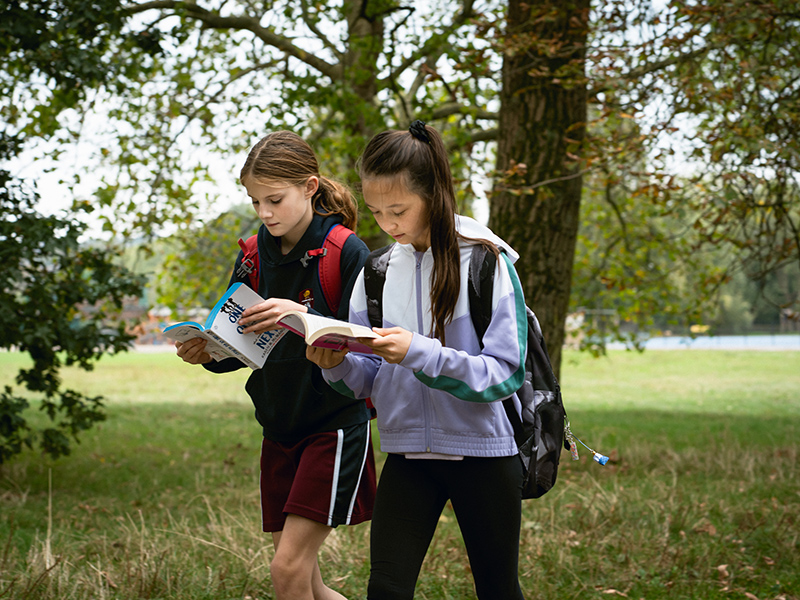
The library is an accessible, welcoming space that the pupils want to be in. There are author talks once a term and last year Ms Niland organised ‘book battles’ which were a huge success. Pupils stood up to champion their chosen book, progressing through various rounds to the final, with the winner’s choice making it onto the ‘Highgreat Reads’ list.
Among the many initiatives this year, we’ve introduced homework reading slots. I realise that promoting reading a pleasurable act and then setting it as a homework task may be a slightly contradictory idea, but it’s more to remind pupils that we value that time in reading, and to build good habits. Not having homework competing with that time might be helpful.
We’ve amplified conversations around reading within the staff community to reignite our passion; sharing, discussing, and recommending books we’ve enjoyed with each other. Teachers are encouraged to read young adult fiction to familiarise ourselves with current authors, so that we can express an interest in what pupils are reading.
Our pupil Reading Prefect in Y13 has been great at thinking of ideas to engage other students. She’s organised Y7&8 Tutor Times with older pupils to meet and discuss their favourite books. She and the Windhover society organised a creative writing competition for Y7-9, who wrote and presented their short stories to each other.
The big event is World Book Day, which sometimes slips under the radar in a lot of senior schools. We’re hoping to rejuvenate it with a non-uniform day (literary themed if they wish, or comfortable ‘reading clothes’) and donations for the Book Trust UK, a charity that aims to bring the benefits of reading to children in the greatest need.
The pupil-led charity committee are organising a book drive for the Children’s Book Project, who gift donated books to targeted communities across the Capital to widen access to reading for disadvantaged children.
There will be readings throughout the day and a declamation of Ovid’s Metamorphoses in Central Hall from the Classics department. Pupils will be presenting extracts of their chosen books in assemblies and teachers are going to read a snippet of a book they’ve enjoyed in each lesson. Even Y9, who will be on their Battlefields trip that day, have been allocated some time to read on their travels.
Whilst I may seem an unlikely candidate – as a maths teacher – to be championing reading, I hope the gesture will help to break the stereotype of who can be a typical ‘reader’. This is a chance for everyone to find what engages them and celebrate what they love.
If I could leave you with one piece of advice it’s this: be inquisitive. Speak to your young people about what they’ve enjoyed reading and maybe ask them to recommend a book to you.
Read more about the events for World Book Day here.
 About the author Dr Keith Brown, Assistant Head (Director of Studies) Keith joined Highgate in 2016 to teach Mathematics, which he still loves doing alongside his commitments as a Midgate tutor. As well as mathematical puzzles Keith enjoys reading, hiking and spending time with his dog.
About the author Dr Keith Brown, Assistant Head (Director of Studies) Keith joined Highgate in 2016 to teach Mathematics, which he still loves doing alongside his commitments as a Midgate tutor. As well as mathematical puzzles Keith enjoys reading, hiking and spending time with his dog.
